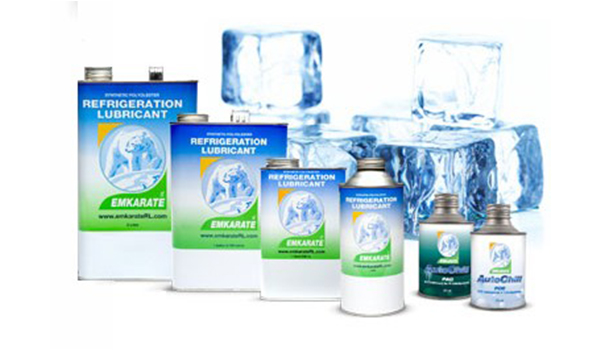Refrigeration systems incorporate many components found individually in various mechanical systems into a single system. All systems incorporate some type of compressor with moving parts requiring lubrication. The demands on lubricants in this type of environment are fairly severe with constant change from the high heat load in the compressor and evaporator to rapid cooling in the condenser. Specialized refrigeration lubricants must be sourced that meet the needs of modern refrigerants with most applications requiring a synthetic refrigeration lubricant.
Refrigeration units are closed loop systems with the oil introduced in the compressor being mixed with the refrigerant. The piping system is designed to return the lubricant and refrigerant back to the compressor. For this to be achieved efficiently, the lubricant selected must have a high miscibility with the refrigerant. This interaction between the lubricant and refrigerant can impact the film forming characteristics of the lubricant on surfaces used for heat transfer. This can affect the overall efficiency of the system as well as reduce lubricant available for friction bearing surfaces in the compressor where it is most needed.
With the shift from chlorofluorocarbon (CFC) refrigerants to hydrofluorocarbon (HFC) refrigerants, mineral oil based lubricants are no longer acceptable. Modern synthetic blends are formulated from bases of polyalkylene glycol (PAG), polyol ester (POE), and alkyl benzene (AB). Systems that use ammonia as a refrigerant are typically compatible with PAG type lubricants where HFC refrigerants of various types use a variety of lubricants.
PAG and POE type oils tend to collect water and break down with incorporated moisture. These oils will contain additives such as hydrolysis stabilizers and antioxidants that help to reduce problems from incorporated moisture. These lubricants will also contain additives that prevent foaming as the solution moves through the system with the refrigerant experiencing gas to liquid phase changes along the way.
Finding the balance for providing proper lubrication, maintaining fluid seals in the compressor chamber, providing cooling to compressor components and for not interfering with the overall efficiency of the refrigerant is a complex task for a formulator of refrigeration lubricants. Maintaining refrigeration systems for optimal functionality requires high quality lubricants. The effective application of chemistry, testing and experience, has provided solutions to all of these challenges which are available in the wide range of refrigeration lubricants offered.
Inquiry Now

